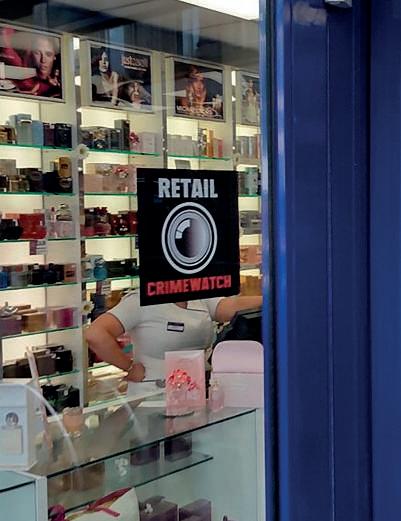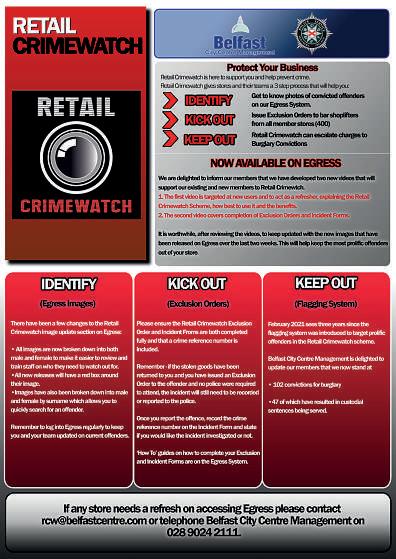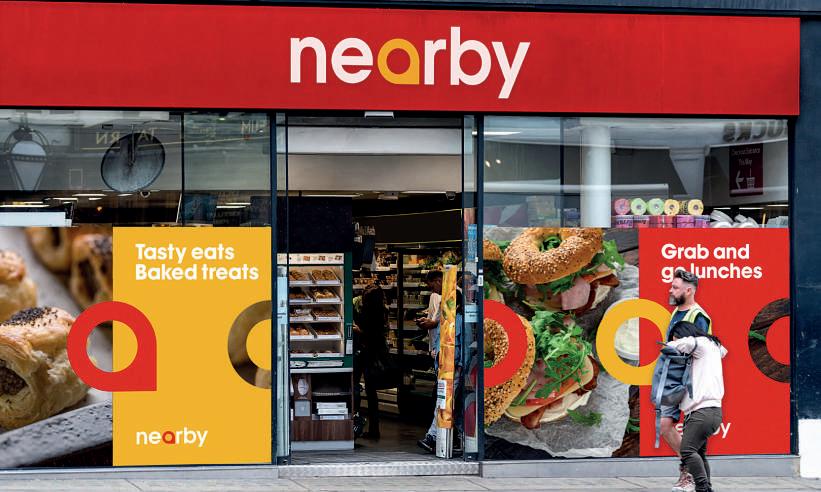
15 minute read
Retail Crimewatch: Julia O’Reilly looks at an
Zero tolerance
J u l i a O ’ R e i l l y a s k s w h e t h e r R e t a i l C r i m e w a t c h - a n i n f o r m a t i o n a n d i m a g e s h a r i n g e x c l u s i o n o r d e r s c h e m e c o u l d m a k e r e t a i l a s a f e r p l a c e f o r a l l
If crime pays, then retailers are footing the cost. The dogs on the street know that Irish retailers today are being subject to not only rampant theft, but verbal and physical abuse while going about their day-to-day business. So dire is the situation, that in the latest CSNA National Security Report, 88% of retailers believe legislation and its enforcement in the sector is insufficient.
Of course, retailers can actively update their in-store security and ensure staff are sufficiently trained. But how much can one team do to protect itself and its customers?
For some guidance, ShelfLife looked at Retail Crimewatch, a crime reduction initiative that is ongoing within the Belfast One district in Northern Ireland. The information and image sharing exclusion order scheme was introduced by Belfast City Centre Management (BCCM), with support from the Department of Justice (DoJ), the Police Service of Northern Ireland (PSNI), the Public Prosecution Service (PPS) and retailers.
Network of retailers
Over the course of 15 years, the partnership has built up a network of 400 retailers across Northern Ireland. These retailers work with statutory agencies to prevent prolific convicted retail theft offenders from entering their premises.
The scheme follows a simple three-step approach: • Identify - identify offenders (new or existing) by sharing images with other members • Keep out – issue an exclusion order for anyone caught shoplifting in a store • Kick out – members of the initiative can prevent offenders from re-entering their store Image sharing is at the heart of the scheme’s effectiveness. Each month, scheme members receive images of some of Northern Ireland’s most prolific shoplifters. Thanks to the image sharing policy the network maintains, a shoplifter in one member store will quickly become a known face across all member stores. Those profiled have been convicted through the courts and banned from entering member stores.
By distributing such images, the scheme increases staff vigilance, boosts awareness of known offenders and assists in reducing stock loss, all while helping retailers maintain a safer environment for staff, customers, and members of the public. This co-operative approach empowers shop owners to work together against a joint menace.
Under the scheme, retailers are entitled to issue an exclusion order to offenders. From the date the order is issued, the offender is no longer permitted to enter the premises of any scheme member for a one-year period. Members can issue such exclusion orders to those found committing theft, attempting to commit theft, or being equipped for theft.
Promising results
The crime prevention system is proving a rampant success. In the past three years, the scheme has seen over 100 convictions for burglary and 47 custodial sentences.
Retail Crimewatch is “the only retail crime reduction scheme in the UK that prosecutes retail offenders for trespass or burglary,” says Geraldine Duggan, city centre manager, Belfast City Centre Management Company, speaking to ShelfLife magazine. “By being in the premises of any member of the Retail Crimewatch scheme, that person is trespassing. The PSNI can then escalate the charge to burglary which carries a custodial sentence.”
For Duggan, the scheme has achieved a “significant accomplishment in deterring prolific offenders and helping to create a safer environment for staff, customers and the public”.
Retailer response
As for the response from retailers, Duggan says it has been ‘very positive.’ “Businesses acknowledge that being a member of Retail Crimewatch can help reduce loss, increase profit margins and protect the sustainability of their businesses,” she added. “Retail crime is a given in the sector, but not all retailers can afford a security team to target shoplifting.”
Twelve months into a turbulent year, the benefits of having a wide support network are abundantly clear. While retailers have been working tirelessly to adapt to the latest health and safety protocols, many have seen a spike in anti-social behaviour from customers in response to mask-wearing. At the same time, mandatory mask-wearing has made the task of identifying offenders more challenging.

Under the Retail Crimewatch scheme currently running in the Belfast One district, retailers are entitled to issue an exclusion order to offenders
Retail Crimewatch members have access to a bank of high-quality images of “prolific career offenders”, which Duggan says can help “any member of staff to identify shop lifters –even with a mask”.
Expanding the scheme
The success of Retail Crimewatch has led to talks of introducing an analogue scheme in the Republic of Ireland. “Belfast City Centre Management is keen to explore the introduction of a similar scheme in the Republic of Ireland, which would provide an effective mechanism to address retail crime,” says Duggan. “Retail crime can cost businesses thousands of pounds, impact on sustainability and ultimately put jobs at risk. That’s why we must tackle it.
“Retail theft is not a victimless crime but by working together to get prolific offenders out of stores and off the street – we can protect business and jobs,” adds Duggan.
The Convenience Store & Newsagent Association (CSNA) was recently invited to join a Retail Crime Working Group; one which would investigate the possibility of introducing a similar scheme in the Republic of Ireland. CSNA - an independent retail association that represents over 1,500 convenience store owners, forecourt operators and newsagents - said it was chosen to participate given the “level of expertise we have acquired in these matters.”
In a statement, the association said it has been “pressing the gardaí and Department of Justice to engage with the Data Protection Commission to find ways to ensure that the privacy rights being afforded to criminals were (at the very least) balanced with the security and safety rights of their victims.”
CSNA seeking solutions
Speaking to ShelfLife magazine, Vincent Jennings, CEO of the CSNA, says: “CSNA has been seeking solutions to the difficulties faced by our members attempting to counteract criminal behaviour in their stores for many years. Antisocial behaviour, shoplifting, aggressive, abusive, and threatening behaviour all have very real and lasting consequences for our staff and customers who deserve to be allowed to serve and shop in peace.
“We do not accept that the lawbreakers should be provided with more ‘rights’ than their victims and are delighted to see the PSNI taking this approach. We have agreed to take part in the Crime Prevention Working Group set up by An Garda Síochána and the Department of Justice to specifically review the Belfast initiative and make recommendations on how a similar scheme could be rolled out in the Republic.”
Ample change is overdue. For too long retailers have been subject to violence, abuse, and theft in their own workplaces. The latest CSNA National Security Report found that 80% of retailers had experienced an incident involving aggressive, violent, and threatening behaviour in their store within three months of the survey taking place, while 58% said they or their staff are subject to verbal abuse on a weekly basis. And, with 90% of retailers saying those perpetrating these unlawful acts are committed by repeat offenders, it’s clear that a zero-tolerance approach is needed now more than ever. ■

The Retail Crimewatch Scheme follows a simple three-step approach, of ‘identify’, ‘keep out’ and ‘kick out’
GET READY FOR GREAT BANANA BAKE OFF 2021 GREAT BANANA BAKE OFF 2021BAKE OFF 2021





CELEBRATE BANANA DAY WITH US ON APRIL 21ST BY TAKING PART IN #FyffesGBB021


Our celebrity judge Donal Skehan will help us to crown Ireland’s best banana dessert maker



To find out how you can enter the competition visit Fyffes Ireland on Facebook or Instagram, and search for #FyffesGBBO21
CAROLINE MCENERY
managing director, The HR Suite
CONTACT THE HR SUITE:
If you require further information or advice on HR, please do not hesitate to contact The HR Suite’s consultants on (01) 9014335 or (066) 7102887 or email the company at info@thehrsuiteonline.com.
M a n a g i n g l o n g - t e r m a b s e n c e
In cases of long-term employee absences, it is crucial to ensure your polices are fully up-to-date with legal requirements. Here, The HR Suite’s Caroline McEnery sets out the considerations all workplaces need to take on board
Long-term sickness is an area of employment which is unavoidable. The introduction of the Workplace Relations Act 2015 means employees now accrue annual leave and public holidays while on certified leave. These are instances that can’t be prevented by workplace policy, but effective planning, management and staff support can help highlight and avoid issues arising. The guidelines and recommended steps below will give an employer a better understanding of how to manage employees in order to reduce long-term sickness.
policy considerations
The first thing the employer must do is to share your policy. It is important for employees to know exactly what your sick policy is and that it can be accessed by all employees at all times. It is recommended that all employers have an absence policy and sick leave policy in place. These policies should cover a number of key areas such as: notification procedures, sick leave payment (if you have that policy), referral to company doctor procedures and a return-to-work policy. A prudent employer will ensure that all managers are trained in order to ensure that they know how to address workplace absences. In addition, they should know when it is and is not permissible to contact the employee. Managers should be trained in relation to what steps they can take if an employee is not following the ‘absence and sick leave policy’ or if the employee has not returned to work after a prolonged period, which may involve the requirement to send the employee to the occupational doctor.
Up-to-date with laws
The most important aspect for the employer is keeping up-to-date with legal requirements about absenteeism and all aspects of employment law. For instance, if the employee is incapable of returning to work under Section 16 (1) of the Employment Equality Act 1998, it states that an employer is not obliged to retain an employee who is not fully capable of doing the job they were employed for. The employer must first look at the factual position concerning the employee’s capacity; this will involve looking at medical evidence. It will also involve a consultation process with the employee to ensure all reasonable accommodations have been explored prior to any decisions being made in respect to their employment. It is vital to record long-term absence accurately and from that, analyse and address the underlying issues. Keeping thorough company records of employee absences and communications allows the employer to identify and spot issues. It is vitally important that an employer ensures they have a paper trail. Best practice suggests, unless the company policy differs, that if an employee is absent for a prolonged period of four weeks or more, the employer should invite the employee to attend a company meeting regarding their absence. This may be conducted face-to-face, or via Zoom in light of current pandemic circumstances. Minutes should be taken at these meetings. All meetings should be followed up in writing and a record of the notes kept.



Following an employee’s long-term absence, an appointment with the occupational doctor should be able to determine how long the employee will remain absent and state if a further appointment will be required
phased return to work
Providing phased return to work options may be done in conjunction with medical advice which may facilitate an employee in getting back to work. Small changes within the workplace and how an employee delivers their work may also make a big difference. What the employer must note is to ensure that any decisions on the phased return or lighter duties are discussed with the employee before implementation and dependent on the severity of the absence. Attendance at the occupational doctor is necessary in order to establish whether continued medical supervision or treatment will be required. Additionally, the report issued by the medical doctor will notify the employer of any reasonable accommodations which may need to be implemented or explored upon their return. The appointment with the occupational doctor should be able to determine how long the employee will remain absent and state if a further appointment will be required in the future. ■
Convenience that’s always
Nearby I n l i n e w i t h i t s b r a n d p r o m i s e c u s t o m e r s , S & W W h o l e s a l e i s w i t h t h e l a u n c h o f a n e x c i t i n g t o o f f e r ‘ A W h o l e L o t M o r e ’ f o r m a k i n g g o o d o n t h a t p l e d g e n e w s y m b o l b r a n d , N e a r b y
S&W Wholesale is proud to be ranked among Northern Ireland’s top 100 businesses, servicing over 2,000 customers across the island of Ireland. According to the business, its continued growth is down to an unique ability to service both independent and symbol retailers, as well as the growth of its symbol brands and employees.
Exciting new symbol brand
Last year, after more than a century in the wholesale business, S&W Wholesale rebranded its offering and promised ‘A Whole Lot More’ for customers. Now, the group is making good on that promise as it announces the launch of a new and exciting symbol brand known as Nearby. Completely exclusive to S&W, Nearby will play a vital part in a wider modernisation strategy to help independent retailers forge deeper connections with the people in the local community.
“Due to the continued growth, we are delighted to introduce our new look brand known as Nearby,” says Arron Potts, head of retail development Ireland.
“After extensive research into the convenience market, we’ve identified the need for a new symbol brand to help retailers connect with their consumers on a more personal level,” he adds. “The Nearby brand will help refresh the look and feel of convenience stores, while keeping the core elements that customers know and love.”
S&W is confident that this fresh and relatable symbol offering will appeal greatly to both customers and retailers alike. “We’ve created a symbol with a sense of community,” says Potts. “A reliable space that people can visit after a busy day to help get the dinner on the table with ease. Nearby delivers a sense of togetherness, convenience and great value for money that’s never too far from home.”

S&W Wholesale currently services over 2,000 customers across the island of Ireland, and plans to grow that number through the introduction of the Nearby symbol brand Nearby delivers a sense of togetherness, convenience and great value for money that’s never too far from home,” says Arron Potts, head of retail development Ireland

Always Nearby and ready to deliver
According to S&W, retailers joining the Nearby family can enjoy all the benefits of a symbol brand while keeping total control over their business. From day one, S&W will work with store owners and employees to understand what makes their space unique. All its people have hands-on experience in retail and will use their knowledge to make your business more successful every day. To take away the pressure, S&W says it doesn’t ask for a long-term contract, marketing fees, weekly advertising or control over what happens in the store. What the team does offer is an attractive brand, bespoke signage, consumer promotional activity, central billing and a dedicated business development manager to guide you with your business needs. Above all, S&W will work as partners, always Nearby and ready to deliver!
“For us Nearby is much more than a symbol store,” Potts adds. “As part of S&W, we will provide the latest market knowledge and technology that your store needs to thrive in today’s ever-changing landscape. With a retail support system in place, retailers can get on with the things that make their businesses truly special – and we’ll take care of the rest.”
Following the launch of Nearby, S&W will be on the lookout for retail partners who are just as passionate about their customers, their products and the future of their stores as they are.
To find out more about the benefits of becoming a Nearby retailer, get in touch today at info@always-nearby.com or contact Arron Potts directly on (+353) 83 193 9229. ■ “After extensive research into the convenience market, we’ve identified the need for a new symbol brand to help retailers connect with their consumers on a more personal level. The Nearby brand will help refresh the look and feel of convenience stores, while keeping the core elements that customers know and love.”










